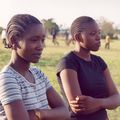Czech Republic! Who Do You Help?

According to the law enacted in 2010, the primary goal of the Czech Development Assistance (DA) shall be contributing to poverty eradication via pursuing sustainable development in the partner countries. A bit more than 4, 3 billion CZK (nearly 166 million EUR) is allocated yearly towards DA in the Czech National budget. A large part of these resources is remitted to various International Organizations and only one tenth of the resources is used for direct cooperation with the partner countries. Though, the bilateral development projects are rather important as they are the most visible part of the Czech DA, and Czech actors play a robust and pronounced role in them.
Gender aspects of the Czech Bilateral DA became the focus of a research initiated within CONNECT, the EU funded project (in the Czech Republic coordinated by Gender Studies). The research reflected upon both the newly reformed CZODA system and one long term educational project implemented in Angola with respect to the commitments the Czech Republic has made towards gender equality at the International and European level. In these commitments, embodied into many Treaties, Resolutions and Declarations, the Czech Republic undertook contributing to gradual elimination of gender inequality and to pursue gender equality in its internal and external affairs. These commitments are rather general and their fulfillment always depends on the state, institution or actor involved in the particular situation. How are these commitments and principles fulfilled in the Czech DA?
In the debate on development it is generally acknowledged that women in the developing countries hold the keys to solving the problems of extreme poverty. On the status, knowledge and education of a woman, to much greater extend than that of a man, depends the well being of her children and family. In this respect the scope dedicated to gender questions within the CZODA is rather narrow, limited and unsatisfactory. Gender equality is almost completely ignored on the levels of legislative, strategy and implementation. The exception to this trend seems to be the main strategic document, the Strategy 2010-2017, where gender equality is presented as one of the three cross-cutting principles. Unfortunately, the conceptual tools utilized in this document are only failed casts of their original forms. The Strategy 2010-2017 overtly conforms to the well known twin-track strategy for gender equality pursued by the EU. The first track of the EU strategy sets for gender mainstreaming through assessing the implications for women and men of any planned action, including legislation, policy or programmes, in all areas and on all levels, with the ultimate goal of achieving gender equality. Yet, the Strategy sees the mainstreaming as reflection of gender equality only ‘in the programming of development cooperation and in various stages of the project cycle´. The second track of the general EU strategy aims at women’s empowerment in any social context where deemed appropriate. The Strategy however connects women empowerment explicitly with the activities in conflict and post-conflict areas. Such a limited and possibly misleading interpretation of these two concepts severely constrains the role they could play in pursuing gender equality.
Similarly, the interviews with the Czech civil servants involved in the CZODA, pursued in the course of the research, reveal very narrow understanding of the problems of gender and the development. People exerting the most influence upon the current CZODA perceive gender issues primarily as the problem of the developing countries which is being out of our reach and not of our responsibility. There is no recognition of influence the Czech DA could have upon forming gender power relations on the household and community level in the target areas. This might be the reason why they often regard demands for reflecting gender aspect in the DA as irrelevant. In this way gender equality is effectively expelled from the Czech official development discourse into exile.
Finally, the analysis of a long term educational programme implemented in the course of the Czech DA in Angola illustrates the vicious effects ignoring the gender aspects in development can bring about. The noticeable low accessibility of education for women in rural Angola is generally well-known and was further confirmed with respect to the Kuemba district where the analyzed programme has been implemented. Nevertheless, this apparent gender inequality has not been seriously reflected in the programme´s agenda until now. Consequently, one of its outcomes is an outstanding empowerment of men. Would the trend of the programme continue for a long time, one day we might see all the boys of Kuemba attending primary schools while two thirds of the girls stay at home looking after the household and cooking for their brothers.
Development cooperation can be of different types. The manner and quality of its implementation depends always on the particular country, society, institution or stakeholder involved. The crucial question appears to be: do we want, in the time of general economical depression and sweeping budget cuts, to take part in the DA, which accepts markedly unjust local practice and fails to help those who need it the most? The official motto of the CZODA is ´Czech Republic Helps´. But whom does it really help? The representatives of the Czech DA often say they have to struggle with a general understanding of the DA as an instrument for export promotion. Sure, they are right abusing the DA´s humanistic goals for asserting particular economic interests is ethically unacceptable. But they should also realize that the current focus of the Czech DA on abstract sectors actually serves such an instrumental approach very well. In this situation it is exactly the sensitivity towards gender inequalities in the people’s everyday lives, which can bring about the much needed humanization of the Czech DA.
Gender Equality and Women’s Empowerment in Czech Official Development Assistance
